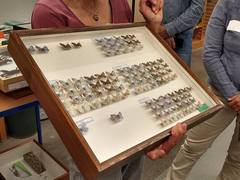Insights and outlooks at the „Landesbiologentag“ [25.10.22]
Stakeholders from education, research and exhibitions talk about the value and relevance of biological collections

Dr. Ann-Catrin Fender, KomBioTa Managing Director spoke about the importance of biological collections for teaching and research in taxonomy.
Last Saturday, October 22, 2022, the Association of Biology, Biosciences and Biomedicine (VBio) organized the Landesbiologentag 2022 in cooperation with the State Museum of Natural History in Stuttgart and KomBioTa. At this conference, representatives from education, research and exhibition as well as VBio members gathered in the lecure halls of the Stuttgart Museum of Natural History.

This box is one of many from the entomological collection of the Stuttgart Museum of Natural History. It shows how different the „Bläulinge (Lycaenidae)“ in Baden-Württemberg can look like. Such insights were made possible during a guided tour of the treasures of the Stuttgart Natural History Collection.
There was a diverse program with talks on the importance and actuality of biological collections. The event was opened with a keynote by Prof. Dr. Gerhard Haszprunar (Ludwig Maximilian University, Munich). Dr. Erich Weber (Head of the Zoological Collection, University of Tübingen) raised the question of how species knowledge can be practically understood without collections, expecially in times of dramatic loss of species and species experts. Furthermore, Ann-Catrin Fender (Managing Director of the Competence Center for Biodiversity and Integrative Taxonomy) presented the different collections of the University of Hohenheim, spoke about their usage in student teaching and illustrated their importance for science by means of selected research projects. A discussion panel with a lively exchange about the upcoming questions as well as the awarding of the Karl-von-Frisch-Prize by the VBio BW were also part of the program. As a highlight, the participants had the rare opportunity to immerse themselves in the collections of botany, entomology, zoology and paleontology and to marvel at the numerous treasures they contained.
During the contributions as well as the following discussions it became clear: Collections are fruitful for any research and exploration of biological relationships and are essential for social life. Pracitical, sustainable learning is only possible if the learning content can be easily observed and grasped.
Back to Latest News